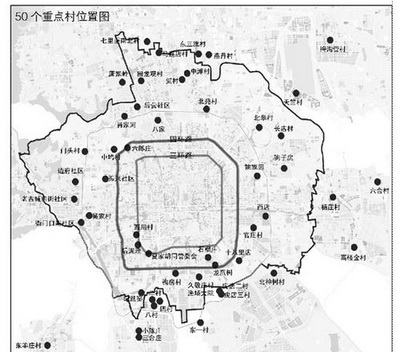50 Beijing Villages to be Torn Down

Beijing plans to transform 50 key villages this year, according to statements made by the vice president of the Beijing Planning Committee, Guo Yuan, yesterday. An implementation plan for the urbanization of the 50 villages has already completed necessary inspection; this month it will be made public which 50 villages to be redeveloped this year.
Currently 14 villages are already undergoing the process of urban transformation and their villagers are being relocated.
The plan ensures that the villagers will be resettled. Their relocation site has already been selected and the next step is to accelerate the planning of the resettlement program.
Regarding the construction plans for new homes for the villagers, villagers have all inputted their requests for high standard apartments. During the establishment of the resettlement plan, officials met with residents and once their approval was received, implementation was allowed to continue. On average the new apartments for the villagers have an area of 50 square meters and contain facilities with energy saving capabilities.
The government also plans to allocate land for the develop of collectively-owned enterprises in order to promote employment opportunities; an average of 50 square meters will be guaranteed per registered resident. Village collectives can make use of these industrial lands by developing their own industries such as businesses, meeting halls, hotels, etc.
The new apartments will also provide homes for migrant workers. "Because there is always a large migrant population living in the villages, the government will encourage the construction of high-quality apartments to meet the housing demand of the migrant population," Guo Yuan said.
All villagers residing within the 50 villages will be relocated, and two-thirds of residents will return to their homes when redevelopment has been completed. They may rent out their new property.
Guo Yuan stated that after the countryside is transformed, the urbanized villagers will legally become city residents and be provided with social security benefits. This policy is currently being formulated by related departments.
Guo Yuan went on to say that the people from all 50 key villages will be allocated a new home within Beijing proper.
Case Study
Tangjialing
Resettlement Location: Hangtian City
Tangjialing is located in Xibeiwang Town in Beijing's northern Haidian District. It is one of the largest of the 50 key villages with a registered population of only 3,000 people and a migrant population of approximately 40,000 people. Tangjialing is widely known as being a village crowded with low-income college graduates known to the media and the average Chinese person as "ant tribe" members who have to share small rooms in the outskirts of Beijing.
According to the official plan, villagers will play a decision-making role in the process of transforming the land upon which their homes are built, they will also get a say in the transformation of collectively-owned enterprise land which will be used to construct tall-buildings.
The original plan was to have registered residents of Tangjialing Village, Tujing village and Xibeiwang Village resettled in the center of the Xibeiwang Town, but now the government plans to have the villagers of both Tangjialing and Tujing return to their original location and live in the new buildings.
Guo Yuan said, details of this round of transformation were a shared decision between all villagers. To protect their future interests, they chose to return to their villages after construction had been completed.
Four days after the reform of Tangjialing began, Liu Zhouyu became a new tenant. He said, "rent was cheaper. My home might be taken away any day. I am just living here as long as possible."
The government has claimed it will have all the houses torn down and residents removed by the end of this year, but some of the villagers consider this "impossible". Some guess they won't be moved from their villages before the new buildings have finished being constructed.
Jia Yue, a taxi driver, is also a tenant of Tangjialing. He has changed his terms of paying rent from once every half year to once a month. An online survey has shown that 60% of tenants plan to leave the village within three months, while over 30% said they would only leave when the government begins to tear down their house.
Links and Sources
Beijing News: Report (Chinese)
Beijing News: Report (Chinese)
The views posted here belong to the commentor, and are not representative of the Economic Observer |




















